| Srl | Item |
| 1 |
ID:
133061
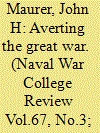

|
|
|
|
|
| Publication |
2014.
|
| Summary/Abstract |
Winston Churchill is best remembered as a valiant leader in times of war. He should also be remembered, however, for his efforts to prevent the catastrophic great wars that would scar the history of the twentieth century. While it is largely forgotten today, on the eve of the First World War Churchill made a remarkable attempt to halt the head-to-head competition in naval armaments that was setting Great Britain and Germany against one another as adversaries. In a bold and unconventional initiative, Churchill invited Germany's rulers to take a "holiday" from the competitive building of battleships. As the civilian head of Britain's Royal Navy, Churchill made public appeals for a naval holiday on three separate occasions before 1914. Behind the scenes too he pressed for the opening of negotiations with Germany, using the holiday proposal as the starting point for discussions. It was Churchill's earnest hope that the naval holiday would stop the action-reaction dynamic of the arms race-what statesmen of that era called "the sea war waged in the dockyards"-and reduce the antagonism between Britain and Germany. Rather than letting Britain and Germany be arrayed in opposing camps, he wanted to promote cooperation between Europe's two leading great powers.
|
|
|
|
|
|
|
|
|
|
|
|
|
|
|
|
| 2 |
ID:
170155
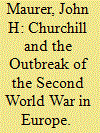

|
|
|
|
|
| Summary/Abstract |
Eighty years ago, World War II broke out in Europe. Remembering this anniversary provides an opportunity to reflect on what we might learn from studying the history of that hideous era. Of the many accounts on the war's origins, Winston Churchill offered one of the most insightful interpretations about how a return of great-power competition shattered Europe's peace. His condemnation of Great Britain's leaders for seeking to appease the Nazi dictator offers a sobering lesson in the failure of the world's democracies to arm themselves and band together to preserve the peace. Churchill lamented that democracy had been weighed in the balance and found wanting. His lamentation still serves as a warning against the folly of military weakness and foreign policy isolation.
|
|
|
|
|
|
|
|
|
|
|
|
|
|
|
|
| 3 |
ID:
178364
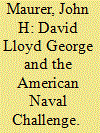

|
|
|
|
|
| Summary/Abstract |
The First World War spurred the United States to acquire – in the words of Woodrow Wilson – ‘incomparably the greatest navy in the world’, and amongst the many problems confronting Britain after 1919 was how to avoid an Anglo-American naval arms race. David Lloyd George was determined not to sleepwalk into another struggle for naval mastery. He rejected the expert opinion of his top naval advisers that building capital ships would enhance Britain’s security. Instead, he showed restraint in responding to the American naval build-up, while doggedly pursuing arms control talks with Washington. He thus prevented an escalation of the naval arms competition that emerged after the war, and so created the favourable conditions for a negotiated settlement of the naval rivalry with the United States and provided for Britain’s security at sea.
|
|
|
|
|
|
|
|
|
|
|
|
|
|
|
|
| 4 |
ID:
170292
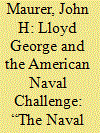

|
|
|
|
|
| Summary/Abstract |
In the immediate aftermath of the First World War, naval competition loomed between Great Britain and the United States. This American naval challenge frustrated Britain’s leaders, who were determined to hold onto their country’s hard-won standing as the world’s leading sea Power. Britain’s Prime Minister David Lloyd George chose the setting of the negotiations at the Paris Peace Conference to force a showdown with American leaders in an attempt to curtail their naval shipbuilding. Much to Lloyd George’s chagrin, the Americans proved obdurate in negotiations. President Woodrow Wilson and his naval advisors refused to stop the American buildup of large and powerful capital ships that called into question Britain’s naval mastery. The deadlocked talks between American and British naval leaders threatened to wreck the peace negotiations and the establishment of the League of Nations. To prevent a breakdown in Anglo-American relations at Paris, Sir Robert Cecil and Colonel Edward House negotiated an agreement that pledged both countries to work towards a settlement of their naval competition. This analysis examines Lloyd George’s motivations and actions in provoking this confrontation to defeat America’s naval challenge in what would later become known as the naval battle of Paris.
|
|
|
|
|
|
|
|
|
|
|
|
|
|
|
|
| 5 |
ID:
118306
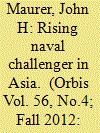

|
|
|
|
|
| Publication |
2012.
|
| Summary/Abstract |
The end of Great Britain's standing as a superpower conjures up a frightening picture of how a post-American world might come about, not by a gradual, managed decline of the United States, but rather by a sudden defeat at sea. Some 70 years ago, Britain's navy suffered staggering losses at the hands of an emerging peer competitor in Asia. Could a reversal of fortune of this magnitude-the world's leading naval power being soundly beaten by a rising challenger-happen again? Britain's naval downfall in Asia provides a sobering parable, warning of potential dangers looming for the United States in the twenty-first century.
|
|
|
|
|
|
|
|
|
|
|
|
|
|
|
|
| 6 |
ID:
134676
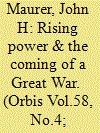

|
|
|
|
|
| Summary/Abstract |
This article examines the strategic decisions that led to the struggle between Britain and Germany, exploring how a great war involving Europe's leading powers could come to pass. In 1914, there were no forces beyond the control of decision makers pushing them into the grisly war of attrition that destroyed the social and political fabric of nineteenth-century Europe and ushered in the horrors of the twentieth century. Rather, those horrors resulted from poor policy and strategic choices made by the leaders of the great powers. The war's outbreak underscores history's contingent nature, dramatically showing how errors in judgment on the part of political and military leaders can ruin great countries. One stark lesson of the Great War is that no leader sought as an outcome the conflagration produced by their decisions. Today, China's weapons programs and foreign policy assertiveness conjures up fears that Beijing seeks to establish a new international order, much as Germany's rulers tried to do a hundred years ago with such catastrophic consequences. Shaping the internal debate among China's rulers, so that they judge self-restraint in armaments and strategy as being in their best interest, will test the strategic acumen of American leaders in the years ahead.
|
|
|
|
|
|
|
|
|
|
|
|
|
|
|
|
| 7 |
ID:
162751
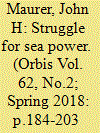

|
|
|
|
|
| Summary/Abstract |
The history of the contest for naval mastery during the Great War has particular resonance for today because the United States now faces a serious threat from China's increasing capabilities to wage war at sea. China's naval challenge calls into question America's continued command of the maritime commons. The stakes at risk for the United States in today's contest are just as high as they were a hundred years ago for Britain. Defeat at sea would wreck American global leadership in the twenty-first century just as surely as it would have meant the collapse of British power in the twentieth. What, then, can we learn from past struggles for sea power and America's entry into the First World War that offers guidance for understanding our current strategic predicament?
|
|
|
|
|
|
|
|
|
|
|
|
|
|
|
|
| 8 |
ID:
117949
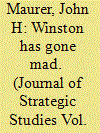

|
|
|
|
|
| Publication |
2012.
|
| Summary/Abstract |
As Chancellor of the Exchequer during the late 1920s, Winston Churchill was at the center of British strategic decision making about how to respond to the naval challenge posed by Japan's rise as a rival sea power. Churchill downplayed the likelihood of war with Japan. The leadership of the Royal Navy disagreed: they saw Japan as a dangerous threat to the security of the British Empire. Examining this dispute between Churchill and the Admiralty highlights the awkward political, economic, and strategic tradeoffs confronting British leaders between the world wars.
|
|
|
|
|
|
|
|
|
|
|
|
|
|
|
|